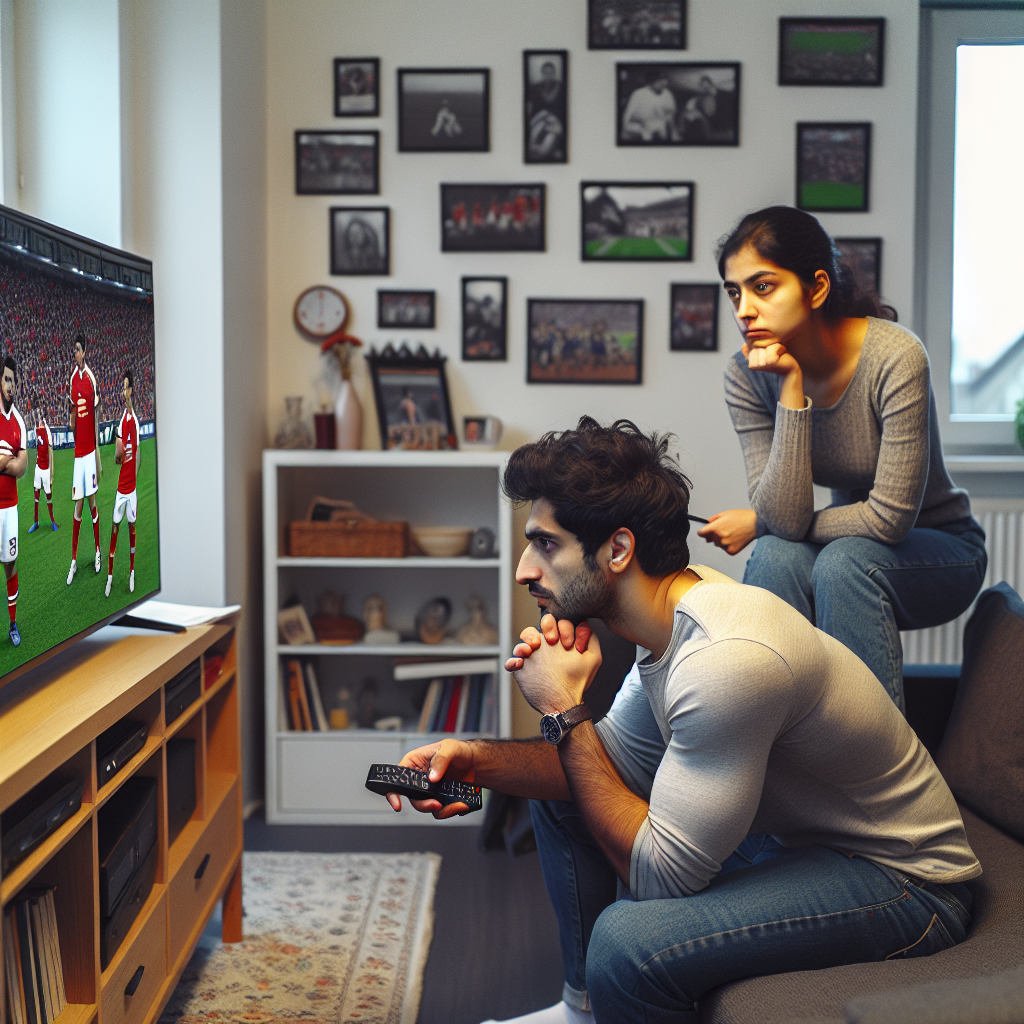Have you ever wondered why your boyfriend seems to prioritize sports over everything else in his life? Whether it’s watching game after game on TV or spending hours playing his favorite sport, it can sometimes feel like you’re playing second fiddle to his sporting obsession. But fret not, dear friend, as this article aims to delve into the reasons behind why your boyfriend might prioritize sports and how you can navigate this aspect of his life with understanding and grace. So, let’s explore the world of sports and relationships together!

Understanding the Importance of Sports in Society
Sports as a cultural phenomenon: Sports have long been a significant part of society, transcending boundaries and bringing people together. Whether it’s a local football match or an international sporting event, sports have the power to unite communities, promote cultural exchange, and create a shared sense of identity. The fervor and passion displayed by fans during sports events showcase the deep-rooted connection between sports and culture.
The influence of sports in shaping identities: Sports play a vital role in shaping individual and collective identities. They provide a platform for people to express themselves, showcase their skills, and represent their communities. From children idolizing their favorite athletes to adults proudly supporting their national teams, sports have a profound impact on how people perceive themselves and others. The success and achievements of athletes often inspire individuals to set goals, work hard, and strive for greatness.
Sports and social bonding: Sports have an innate ability to foster social bonds and strengthen relationships. Whether playing on a team or cheering for one, sports provide a common ground where people can come together, engage in friendly competition, and build lifelong connections. The shared experiences, emotions, and memories created through sports create a sense of belonging and camaraderie among participants and fans alike. Sports bring people together, breaking down barriers and promoting inclusivity.
Psychological Aspects of Sports Prioritization
The psychological need for competition: The desire to compete is deeply ingrained in human nature. Sports provide an outlet for individuals to fulfill their innate need for competition and challenge. Engaging in sports allows people to test their limits, showcase their skills, and strive for personal growth. Competition in sports often serves as a driving force, pushing individuals to improve themselves and achieve higher levels of performance.
Sports as a stress relief mechanism: In today’s fast-paced world, stress has become a prevalent issue for many individuals. Engaging in sports can serve as a powerful stress relief mechanism, allowing people to escape their daily worries and focus on the present moment. The physical activity involved in sports releases endorphins, which are natural mood boosters and stress relievers. Additionally, participating in sports provides a sense of achievement, increasing self-confidence and reducing anxiety.
Escape from daily routines: Sports offer individuals a chance to break free from their mundane daily routines. Whether it’s heading to the gym for a workout session or joining a local sports league, engaging in sports provides an opportunity for individuals to explore their passions, try new experiences, and break the monotony of their everyday lives. The excitement and thrill of sports can bring a refreshing change to one’s routine, reinvigorating the mind and body.

Impacts of Media and Advertising
Media portrayal and influence on individuals: The media plays a significant role in depicting sports and athletes, shaping public perception and influencing individual preferences. Advertising campaigns, endorsements, and media coverage heavily influence the popularity of certain sports and athletes. Media portrayal also affects the way individuals perceive sports and their role in society. The media’s focus on high-profile events and star athletes can inadvertently lead to the neglect of other sports, impacting individuals’ choices and priorities.
Sports as a form of entertainment: Sports serve as a source of entertainment for billions of people worldwide. Whether it’s watching a live match or following updates on social media, sports provide a means of relaxation, excitement, and engagement. The adrenaline rush experienced while watching a close game or witnessing a remarkable athletic feat is unmatched. The entertainment value of sports contributes to their widespread popularity and the high priority they hold in many individuals’ lives.
Advertising and financial investments: The influence of advertising in the sports industry cannot be underestimated. Brands invest heavily in sports sponsorship deals, leveraging the popularity of athletes and sporting events to promote their products. These financial investments contribute to the growth and development of sports, ensuring the availability of resources necessary for athletes to excel. However, the commercialization of sports and the increasing influence of advertising can also lead to conflicts of interest and compromises on the integrity of the game.
Personal Satisfaction and Accomplishment
Achievement and personal growth: Engaging in sports provides a sense of achievement and personal growth. Whether it’s scoring a goal, running a marathon, or mastering a new skill, the journey of improvement and the satisfaction of reaching milestones can be immensely fulfilling. Sports teach individuals the value of hard work, discipline, perseverance, and teamwork. The sense of accomplishment that comes from overcoming challenges in sports translates into other areas of life, fostering personal growth and a positive mindset.
Sense of belonging to a team: Being a part of a sports team cultivates a sense of belonging and fosters valuable interpersonal skills. The camaraderie developed through shared goals, experiences, and victories creates a bond like no other. The support, encouragement, and camaraderie within a team contribute to an individual’s overall well-being and sense of belonging. The relationships formed through sports can extend beyond the field, creating lifelong friendships and a strong support network.
Pride and self-esteem: Accomplishments in sports boost an individual’s self-esteem and foster a sense of pride. Whether it’s winning a championship or simply improving personal performance, the recognition and validation received in sports enhance one’s self-worth. The sense of pride derived from sports achievements builds confidence, resilience, and a positive self-image. This increased self-esteem positively impacts various aspects of life, including relationships and personal goals.

Social Norms and Expectations
Gender stereotypes and sports: Gender stereotypes have historically influenced the prioritization of sports. Certain sports have often been associated with masculinity or femininity, leading to societal expectations and pressures. However, the narrative is changing, and efforts are being made to promote gender equality and inclusivity in sports. It is crucial to challenge and break down these stereotypes to create a supportive environment where individuals can pursue their athletic passions without judgment or limitations.
Peer pressure and societal expectations: Peer pressure and societal expectations can significantly impact an individual’s priorities in sports. The desire to fit in, gain acceptance, or meet societal standards often influences decisions regarding sports participation and prioritization. Understanding and addressing these external pressures is essential for individuals to prioritize their own passions and make choices aligned with their personal interests and values.
The influence of family and friends: Families and friends play a crucial role in shaping an individual’s relationship with sports. Whether it’s parents encouraging their children to participate in sporting activities or friends sharing their enthusiasm for a particular sport, the support and influence of loved ones can shape one’s interest and dedication to sports. It is important for individuals to consider their own desires and preferences while navigating the influence of family and friends.
Implications for the Relationship
Different interests and compatibility: It is common for individuals in a relationship to have different interests and priorities, including sports. Recognizing and understanding these differences is key to maintaining a healthy and balanced relationship. While sports may hold a significant importance for one partner, the other partner should be open to explore and appreciate their partner’s passion, even if it does not align with their own interests. Compatibility in a relationship involves respecting and valuing each other’s individuality.
Communication and compromise: Effective communication is vital in addressing conflicts or differences arising from sports prioritization. Both partners should express their needs, concerns, and expectations openly and calmly. Finding a middle ground and compromising on certain aspects can help ensure a balanced and harmonious relationship. Open communication also allows for mutual understanding and empathy, fostering a supportive environment for both partners.
Establishing common ground: While each partner may prioritize different activities, finding common ground in terms of shared interests and activities is crucial. Exploring new sports together or supporting each other during games can create opportunities for bonding and shared experiences. It is important for both partners to actively invest time and effort in understanding and participating in each other’s passions, strengthening the foundation of the relationship.

Balancing Priorities in a Relationship
Open and honest communication: Balancing priorities in a relationship requires open and honest communication. Both partners should feel comfortable expressing their needs and desires while actively listening to each other’s perspectives. Discussing individual goals, expectations, and limitations can help identify areas where compromise and understanding are necessary.
Respecting each other’s passions: Respecting and valuing each other’s passions is crucial in maintaining a healthy relationship. While one partner may prioritize sports, the other partner should understand and appreciate the importance it holds for their loved one. Showing support, actively engaging in conversations, and attending games or events demonstrates respect and consideration for each other’s interests.
Finding mutual activities: Finding activities that both partners enjoy can help strike a balance between individual interests and shared experiences. Exploring new hobbies, taking up a sport that appeals to both partners, or engaging in recreational activities together can strengthen the bond and create cherished memories. The key is to find activities that bring joy and fulfillment to both partners and foster a sense of togetherness.
Overcoming Sports-Related Conflicts
Addressing feelings of neglect: When one partner prioritizes sports, it can sometimes lead to feelings of neglect or insignificance in the relationship. It is crucial to address these feelings openly and honestly. Expressing one’s emotions and concerns allows for a better understanding of each other’s needs and helps find ways to balance the relationship while still maintaining individual passions.
Negotiating time and attention: Negotiating time and attention is critical in managing conflicts arising from sports prioritization. Both partners should have open discussions and establish boundaries, considering factors such as practice schedules, game days, and personal time commitments. Finding ways to allocate quality time for the relationship while accommodating the individual’s sports commitments can help strike a balance.
Seeking professional help if needed: If conflicts surrounding sports prioritization become persistent and difficult to handle, seeking professional help can be beneficial. Couples therapy or relationship counseling can provide a neutral environment for open communication and facilitation of conflict resolution. A trained professional can guide couples in identifying underlying issues, developing effective communication strategies, and finding mutually acceptable solutions.

Reevaluating Personal Priorities
Understanding own needs and desires: Reevaluating personal priorities requires individuals to reflect on their own needs and desires. It is important to question whether sports truly hold the significance one assigns to them and whether there are other aspects of life that require attention. Self-reflection allows individuals to gain clarity on their passions, interests, and areas where they may need to strike a balance.
Setting goals and priorities: Setting clear goals and priorities is crucial in reevaluating personal commitments. Analyzing the importance and impact of sports in one’s life can help in establishing a hierarchy of priorities. Understanding the long-term implications and considering factors such as personal growth, relationships, and overall well-being can aid in creating a more balanced approach to both sports and other aspects of life.
Finding a balance that works: Striking a balance between sports and other commitments is a continuous process. It involves regularly assessing and readjusting priorities to ensure that all aspects of life are given due attention. It is important to remember that finding a balance is a personal journey, and what works for one may not work for another. Individuals should strive to create a balance that aligns with their values, aspirations, and overall happiness.
Seeking Relationship Support and Advice
Talking to friends or family: Discussing relationship concerns with trusted friends or family members can provide valuable insights and support. Sharing experiences and seeking advice among those who know and care about you can offer different perspectives and guidance. However, it is essential to remember that advice should be taken with caution, as every relationship is unique and what works for one couple may not work for another.
Counseling and therapy options: Seeking professional counseling or therapy can offer a structured and guided approach to resolving relationship conflicts. Couples therapy or individual counseling can provide a safe space for open communication, conflict resolution, and personal growth. A trained therapist can help couples navigate the complexities surrounding sports prioritization and provide strategies for finding a balance that works for both partners.
Online communities for guidance: Online communities and forums focused on relationships and personal growth can offer a space for individuals to seek guidance and support. Engaging with others who may have similar experiences can provide reassurance, advice, and solutions. It is essential to exercise caution and discernment when participating in online communities, as not all advice may be credible or suitable for individual circumstances.
In conclusion, sports hold significant importance in society due to their cultural influence, impact on personal development, entertainment value, and the ability to shape social norms. Understanding the psychological aspects of sports prioritization, acknowledging the impacts of media and advertising, and recognizing the personal satisfaction and accomplishment derived from sports are essential in navigating conflicts in relationships. Balancing priorities requires open communication, respect for individual passions, and finding common ground. While conflicts may arise, addressing them through honest dialogue, negotiation, and seeking professional help when needed can strengthen relationships and help individuals reevaluate personal priorities. Ultimately, finding a balance that aligns with one’s values, needs, and desires is a continual process, and seeking support from friends, family, counseling, or online communities can provide guidance along the way.






